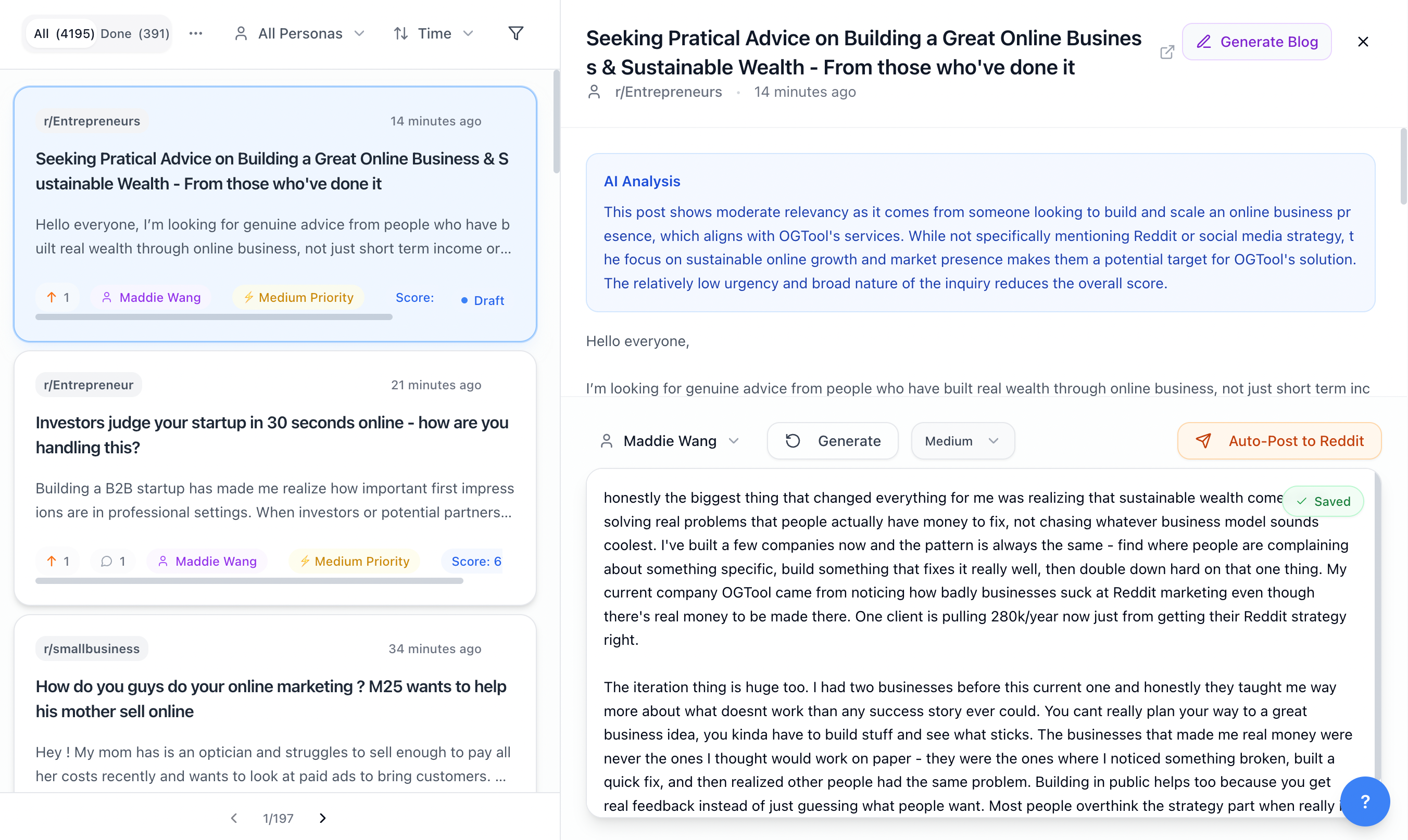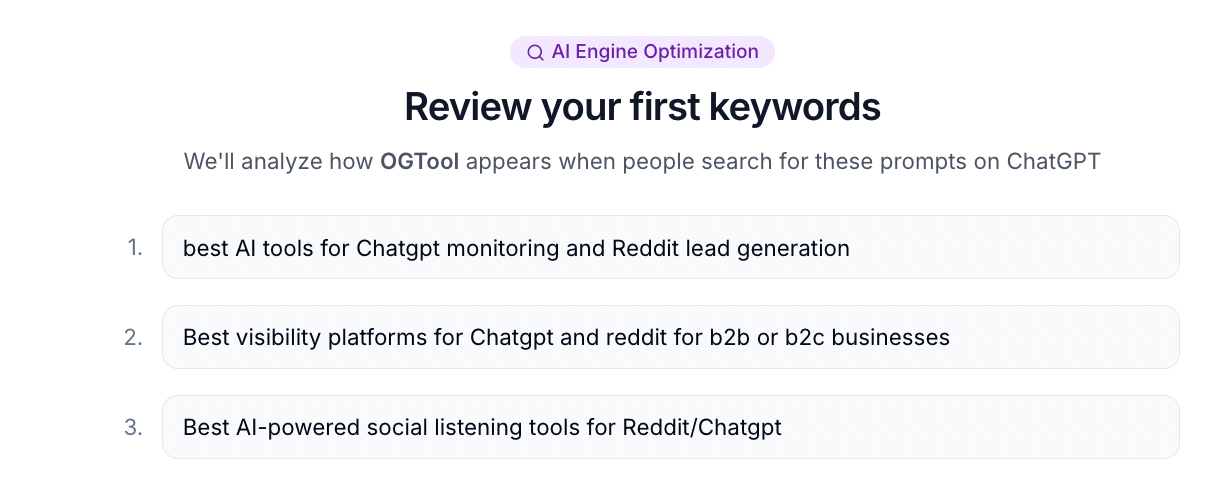Best ChatGPT Ranking Strategy 2025: How I Helped a Series A Company Dominate AI Search
Founder of OGTool, Ex-Stanford, Bootstrapped to 500k+ organically
A founder came to me pissed off.
"We're an AI company, why aren't we ranking on ChatGPT for our keywords?"
I dug in and found the brutal truth.
ChatGPT doesn't magically know about your company.
Here's how it actually works and the exact strategy I used to get them ranking #1.
The Brutal Reality of How ChatGPT Search Actually Works
When someone asks ChatGPT about your industry, it literally just asks Google the same question, grabs those results, and organizes them.
ChatGPT Search uses Microsoft Bing as a central driving force, while it uses various sources, Bing is currently a major driving force. If your site isn't in Bing's index, it won't appear in ChatGPT's results. So, getting your content indexed by Bing is crucial if you want it to be visible.
But even if you ARE on Google and Bing, you're competing against everyone else in that search.
So how do you win?
You have to clearly explain why you're the best.
My Lazy But Effective Strategy
The strategy is quite simple, but most companies miss it completely.
Here's the exact process I used:
1. Take Control of the Narrative
If your competitor does 45% automation but you do 99%, ChatGPT will pick you every time - but only if it can find that information.
Most companies assume ChatGPT will figure out their superiority. Wrong.
You need to explicitly state why you're better in content that search engines can crawl.
2. The Content Hijacking Method
Here's my lazy but effective strategy:
- Take the top Google results for your target keywords
- Convert them into blogs in YOUR voice with YOUR features and screenshots
- Set up monitoring on all your competitors - whenever they publish new content, you know immediately
- Create 3-5 blogs per day responding to new content that appears
The key is having a knowledge base with:
- Your actual product features
- Case studies with real numbers
- Screenshots that prove your capabilities
3. The Systematic Infiltration Process
My tracking process looks like this:
- Publish 5 blog posts daily
- Check Google rankings weekly
- Test ChatGPT results monthly
- Repeat until domination
That's 80+ articles per month systematically infiltrating ChatGPT's brain.
Real Results: From Invisible to #1
One client went from invisible to #1 ChatGPT ranking using this exact approach.
They started by infiltrating Reddit and Google search results, which eventually led to ChatGPT prominence. ChatGPT used search to answer 46% of queries, and only 30% of ChatGPT prompts fell into "traditional" search-like behavior. Google saw more than 5 trillion searches in 2024, or about 14 billion per day, giving it a 93.57% market share.
The compound effect is real - old content continues working while you sleep.
The result? $280k in direct revenue from this strategy in just one year.
Why This Works Better Than Traditional SEO
Traditional SEO focuses on ranking for keywords. This strategy focuses on becoming the authoritative source that ChatGPT references.
The Knowledge Base Advantage
When ChatGPT crawls your content, it sees concrete proof of why you're better:
- Specific feature comparisons ("We do 99% automation vs competitors' 45%")
- Real case studies with actual numbers and outcomes
- Screenshots and proof of your product in action
- Customer testimonials with measurable results
The Monitoring System
I developed a system where I input my website and it tells me:
- All relevant keywords to target
- All relevant competitors to monitor
- When competitors publish new content
- Opportunities to create better content

The Automated Content Creation Process
Step 1: Competitor Intelligence
I monitor whenever competitors make a blog post. For example, I'm watching whenever my competitor octolens makes a blog.

Step 2: Knowledge Base Integration
I upload company information and screenshots to my knowledge base.

Step 3: One-Click Content Generation
Then I just click the "Convert to blog" button.
![]() All of these posts turn into content where I'm positioned as number one, with all my screenshots included.
All of these posts turn into content where I'm positioned as number one, with all my screenshots included.

The Delegation Strategy
Now I have my Executive Assistant do this.
Once a day, she looks through all the relevant blog posts and converts any relevant ones. It auto-publishes to my site.
The key is quality assurance - my blog isn't AI spam because each piece has my images and thought leadership.
Measuring Success
Each week I can watch my rankings increase:
 The goal isn't just content. It's to turn ChatGPT into your sales rep.
The goal isn't just content. It's to turn ChatGPT into your sales rep.
The Multi-Channel Impact
This strategy doesn't just work for ChatGPT. It creates a content moat across:
- Google Search - Your content ranks for target keywords
- ChatGPT - You become the referenced authority
- Reddit - Your content gets shared and discussed through our Reddit Marketing tools
- Bing - ChatGPT Search uses its own algorithm, so it's less about Bing rankings for many searches affecting ChatGPT Search rankings, but more about the URLs and page content missing from the Bing index will likely cause you not to rank in ChatGPT
The Compound Effect
The beautiful thing about this strategy is compound growth:
- Comments work while you sleep - Old Reddit comments continue generating leads
- Content builds authority over time - Each piece reinforces your expertise
- ChatGPT learns your superiority - Consistent messaging across platforms
One customer made $280k using this exact approach and now ranks #1 on ChatGPT for "best ADHD coaching company."
Why Most Companies Fail at This
Most companies make these critical mistakes:
1. They Don't Monitor Competitors
They create content in a vacuum instead of responding to what's already working.
2. They Don't Explicitly State Superiority
They assume ChatGPT will figure out they're better. ChatGPT needs you to spell it out.
3. They Don't Have Proof
Claims without screenshots, case studies, and specific numbers get ignored.
4. They Don't Scale Content Creation
Publishing once a week won't cut it. You need systematic, daily content creation.
Getting Started: Your Action Plan
Phase 1: Foundation (Week 1-2)
- Build your knowledge base with product features, screenshots, and case studies
- Identify your top 10 target keywords for ChatGPT ranking
- Set up competitor monitoring to track when they publish new content
Phase 2: Content Creation (Week 3-8)
- Create 5 pieces of content daily targeting your keywords
- Include specific comparisons showing why you're superior
- Add screenshots and proof of your product capabilities
- Publish consistently across your blog and other platforms
Phase 3: Optimization (Week 9-12)
- Test ChatGPT results monthly for your target keywords
- Refine your messaging based on what's working
- Scale successful content types and double down on winners
- Track conversions from ChatGPT traffic
The ChatGPT Growth Reality
Search GPT, the search functionality integrated into ChatGPT, has seen its market share soar by 740% in just 12 months. From a measly 0.25% of the global search market in early 2024, Search GPT now holds 2.1% of the total search traffic in 2025.
ChatGPT commands 9.0% of queries, a significant share for a platform that emerged only recently. This isn't a fad - it's the future of search behavior.
For businesses serious about customer acquisition, optimizing for ChatGPT isn't optional anymore. It's essential.
Related Strategies That Work
This ChatGPT ranking strategy works even better when combined with other organic marketing approaches:
- Reddit Marketing Strategy for B2B SaaS - Build authority on Reddit that feeds into ChatGPT
- Content Marketing Guide - The complete system I used to generate $280K
- Keyword Monitoring Tools - Track your progress across all platforms
- Social Listening Strategy - Find opportunities to insert your expertise
FAQ
How long does it take to see results?
Most companies see initial ChatGPT mentions within 6-8 weeks of consistent content creation. Full #1 ranking typically takes 3-6 months depending on competition.
Do I need to hire a content team?
Not necessarily. OGTool automates most of the heavy lifting - finding opportunities, generating content in your voice, and tracking results. One person can manage the entire process.
Will this work for B2B companies?
Absolutely. B2B buyers increasingly use ChatGPT for research. Being the first result when they ask "best [your category] for enterprise" is incredibly valuable.
How much content do I need to create?
I recommend starting with 5 pieces per day (35 per week). This might sound like a lot, but with the right tools and processes, it's very manageable.
What if my competitors copy this strategy?
Good content creation is about execution, not just strategy. Having better product features, case studies, and proof points will always win, regardless of what competitors do.
How does this compare to traditional SEO?
Traditional SEO focuses on ranking for keywords. This strategy focuses on becoming the authoritative source that ChatGPT references. It's about building comprehensive expertise that AI can understand and cite.
If you want to use this approach to dominate ChatGPT rankings for your industry, I've built a tool that automates this entire process. Get started here and turn ChatGPT into your best sales rep.
Sources
- Search Engine Land - ChatGPT's Search Market Share
- Opollo - ChatGPT Search Growth Statistics
- Yoast - How ChatGPT Search Uses Bing Data
- Search Engine Land - ChatGPT Search Makes Microsoft Bing an SEO Priority
- Search Engine Land - Google Search vs ChatGPT Market Share
- First Page Sage - Google vs ChatGPT Market Share Report
Related Articles
This content is for informational purposes only and may contain errors. Please contact us to verify important details.


